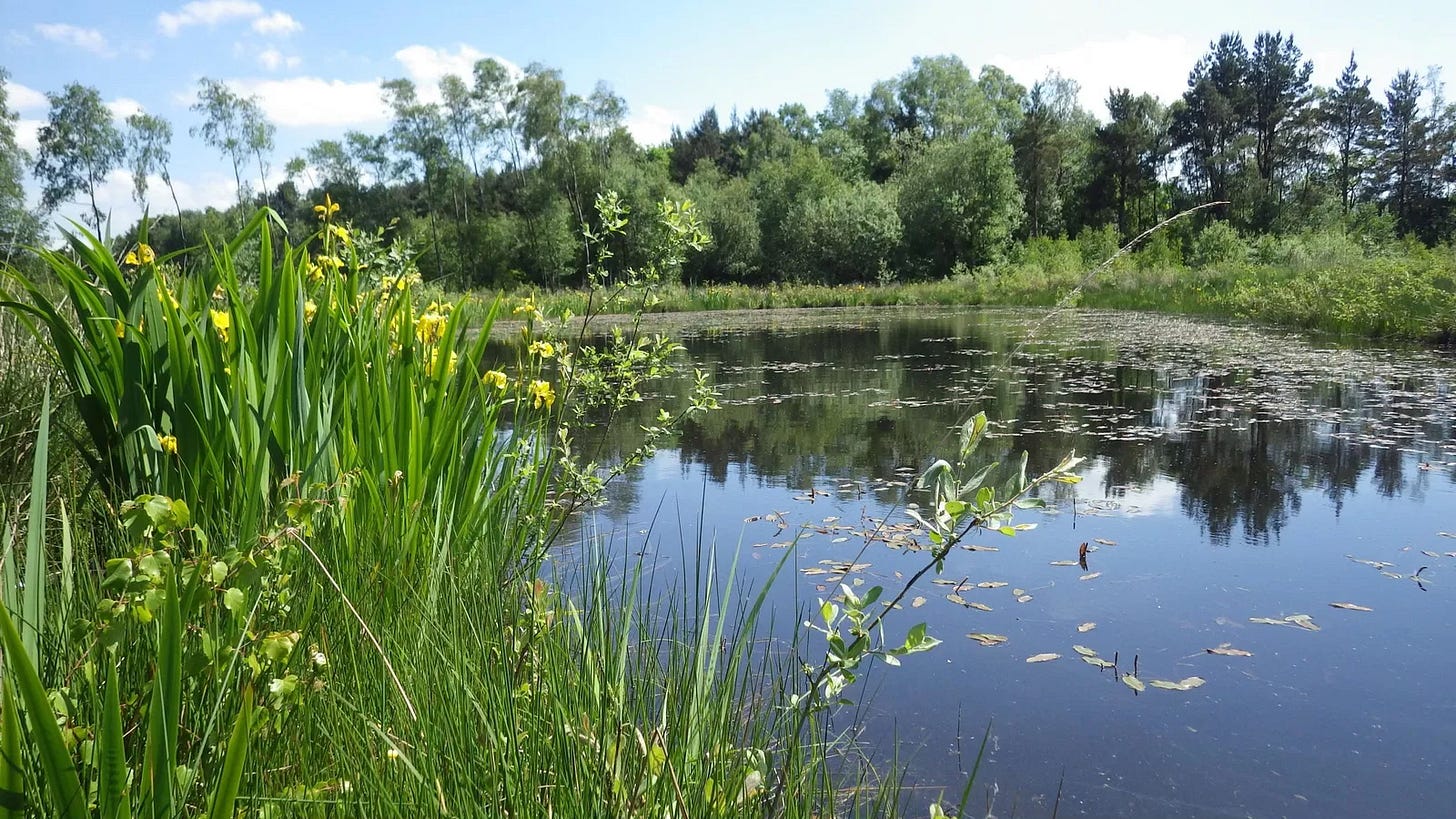Eutropia
(A fable)
Portlandia, a farmer in the Pacific Northwest, had a large, beautiful pond on her property. She and her family and others in the community around the farm fished, swam and boated on it. Portlandia irrigated her crops and watered her farm animals from it. The farm and pond were held as beacons of pristine beauty and productivity, attracting the envy of people all around the world who came to visit it. Many in the regions surrounding, and beyond, the farm depended upon its bounty. Those who worked on it were grateful to be a part of Portlandia’s wonderful enterprise.
One day, Portlandia noticed a small mat of algae floating below the pond’s surface. These things happen in ponds, she thought. No need to overreact. When the mat grew significantly every day over the next week, she consulted a limnologist who educated her about the process of eutrophication. If left untreated, the limnologist told her, these algal mats could double in size every day, consuming the water’s oxygen, killing off the fish or forcing them to swim away through one of the pond’s many creeks connecting it to other ponds and rivers. Portlandia’s pond, the limnologist warned, could soon become too toxic to drink or use for irrigation and it could die if Portlandia didn’t address the problem fast.
Some in the surrounding community chided the limnologist’s advice. They told Portlandia that her systemic mismanagement of the farm was the sole cause of this situation. They told her that it was never pristine and healthy. They said her farm was a symbol of privilege and entitlement and overuse, and the algae was but a testament to her corrupt practices. Farmers like Portlandia were bad people, they said. They demanded a change in the farm’s management. They told her that their radical approaches to farming, along with a few small manual attempts to physically remove a clump or two of algae in the near-term, would save the pond. Under their management, the farm would be a vanguard in a new age of agriculture and animal husbandry. Portlandia knew that some of their specific criticisms had merit but was disturbed by the thoughtless and vindictiveness of others.
When the mat continued to grow, Portlandia’s spouse and children and nearby neighbors begged her to prioritize the pond’s immediate cleanup over other matters before it died. If she waited too long, they told her, only draconian and dystopian measures would be able to ward off the farm’s ultimate demise. Like Portlandia, the family and neighbors agreed with some of the criticisms. Better practices were needed, like limiting or discontinuing the use of noxious pesticides and chemical fertilizers and blocking farm runoff entering the pond. But the top priority must be getting the pond healthy immediately or there would be nothing to save.
The angry critics continued to cower Portlandia and others into silence. They opposed doing anything to fix the dying pond, arguing that any pragmatic efforts to clean it were simply a device to keep the status quo. The critics boasted that their “systemic” treatments, if implemented, would be held up as an example of productivity maximization and equity optimization to all the world once they materialized in the coming decades. They pointed to the great agricultural lessons from Eastern Europe and the Soviet Union during the middle of the last century as models to emulate. They visited beautiful European cities, partaking of their exotic lodgings and victuals, to see how other farms dealt with algal blooms. They brought in social scientists who argued that algae were, in fact, a great foodstuff for the masses. They showed metrics to show that crop yields rise when algal blooms overtake the water systems. They proposed measures to help the algae grow faster in the pond.
Portlandia, worn down by the opposing groups arguing endlessly over how to treat the pond, hesitated to do anything. Soon, the pond was no longer suitable for swimming or boating. Dead fish floated on its surface. Her livestock sickened. Her crop yield diminished. The visitors from all around the world stopped coming to visit the farm.
One beautiful late fall day, Portland awakened and looked east out over her front porch. The sun rose over Mount Hood looming in the distance. The foliage on the trees was a kaleidoscope of mashed colors. The air, crisp and clean, invigorated her. She felt gratitude for the opportunity to live in such a wonderful place. Glad to be alive, she walked down to the pond to see how things were playing out.
A single algal mat covered half of its surface.
Portlandia fell to her knees and cried.





The only thing this tale lacks are the significant amount of “neighbors” who also refuse to acknowledge that the algae even exists or has toxically grown out of control. When you drink rancid water for too long, perhaps you stop tasting how rotten it is. They happily continue to boat around in the polluted pond and loudly shout down anyone who points out that it’s eating holes in their boat. Surely, those critics pointing out the dangers aren’t even from around there and should just be quiet. Tragically, their pathological denial does not save them from ultimately suffering the effects.
Very well written! Let those have ears to hear take this to heart.